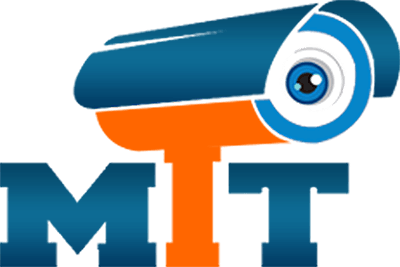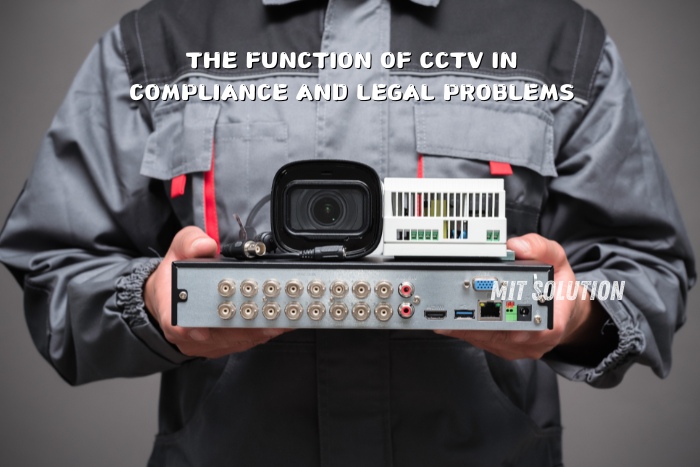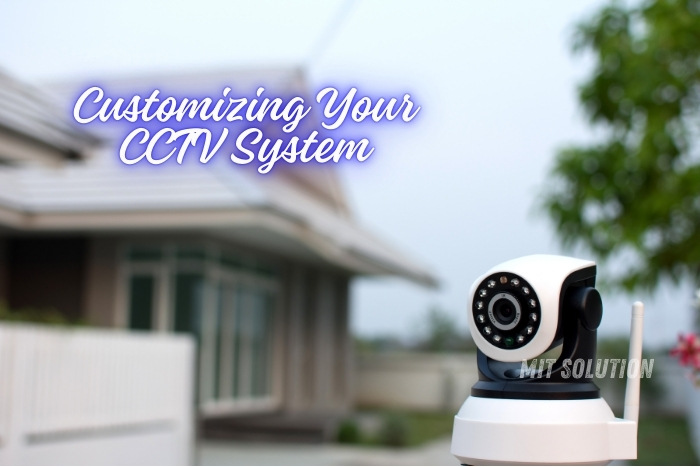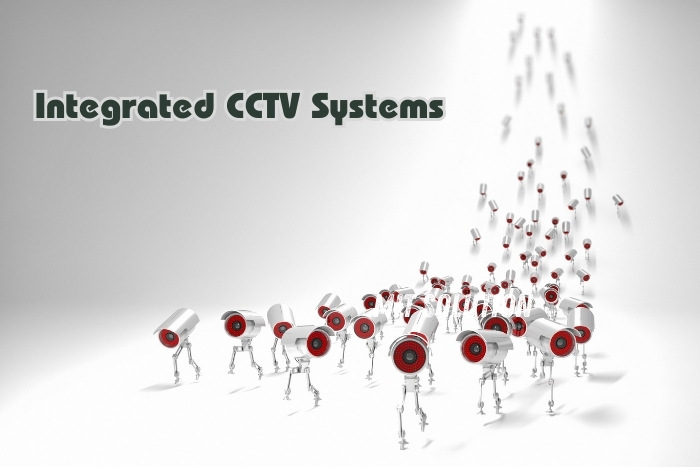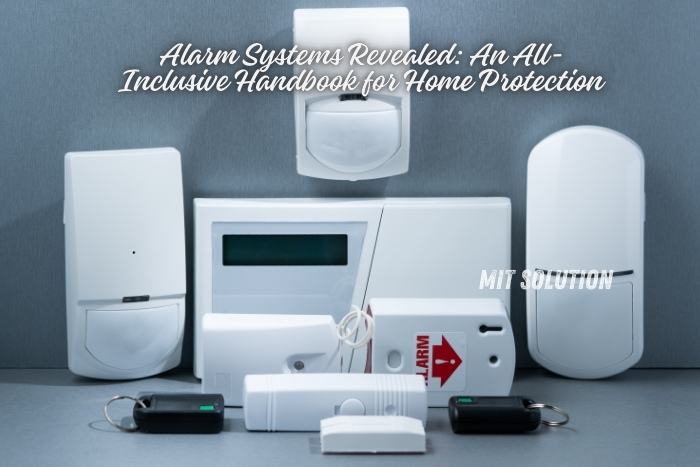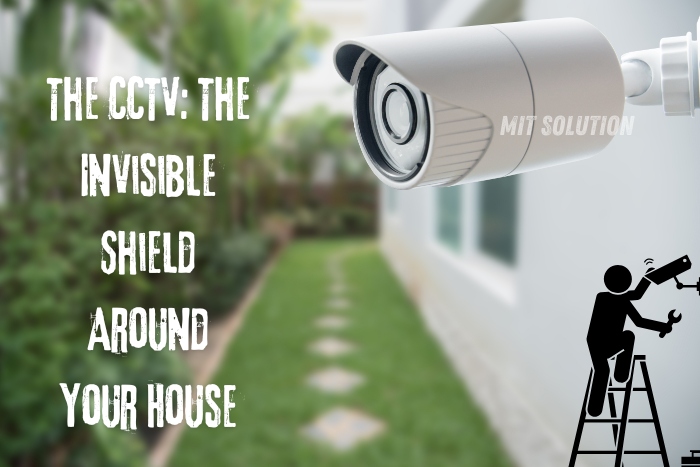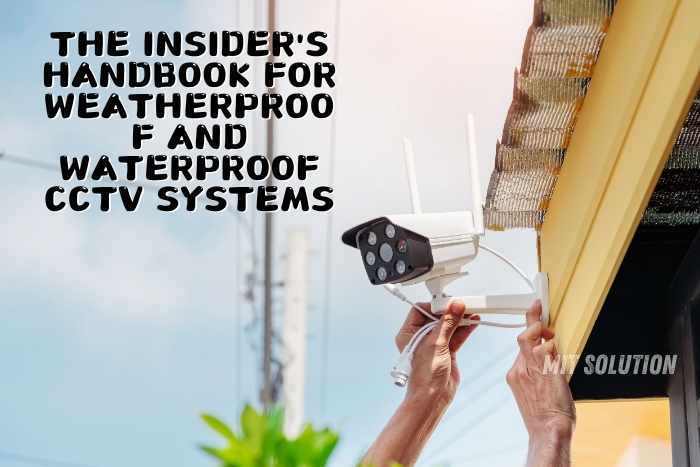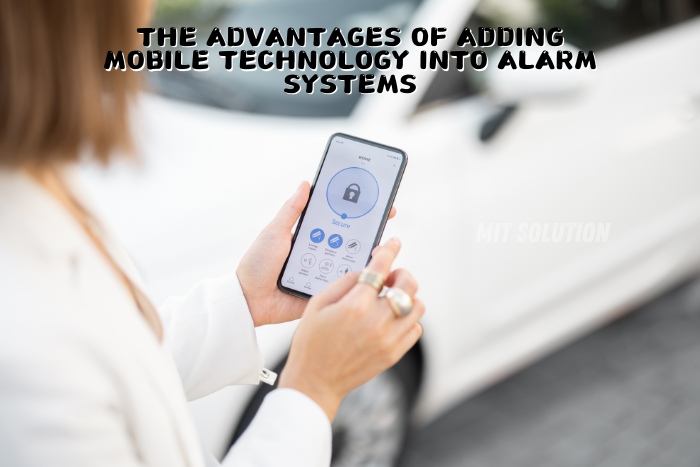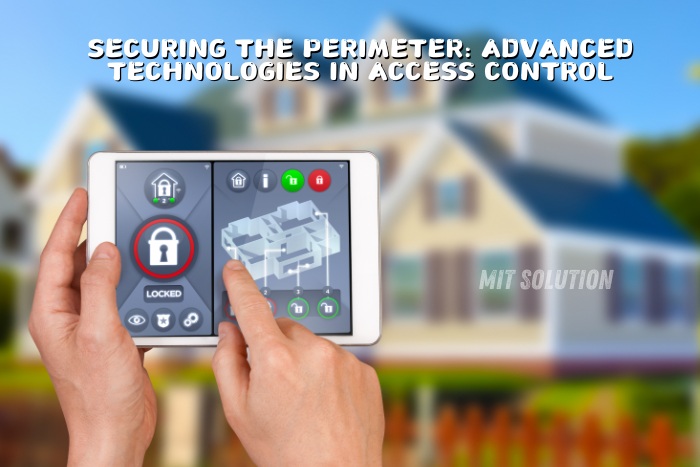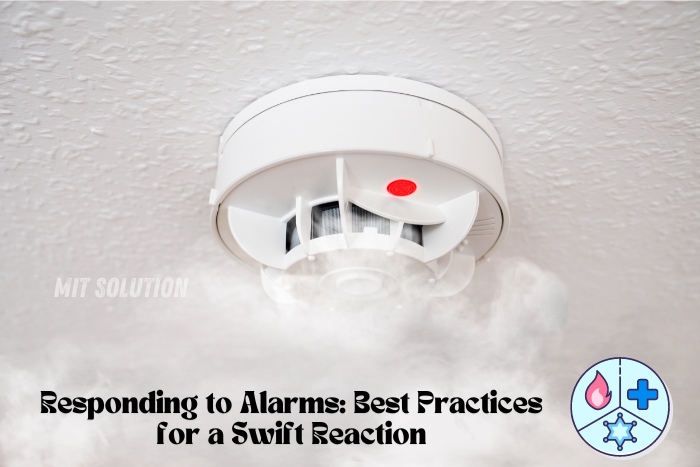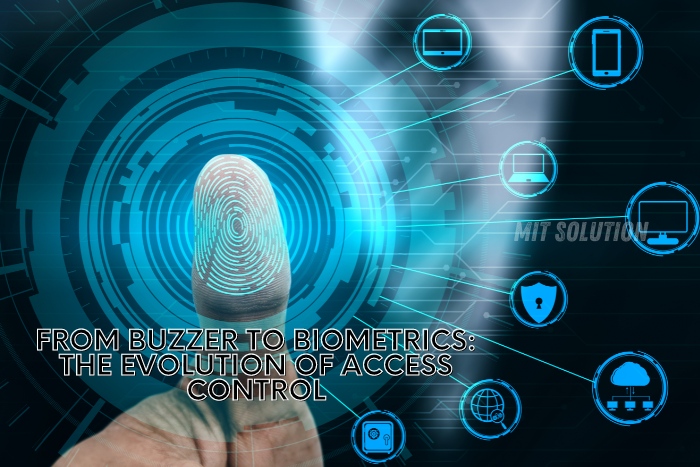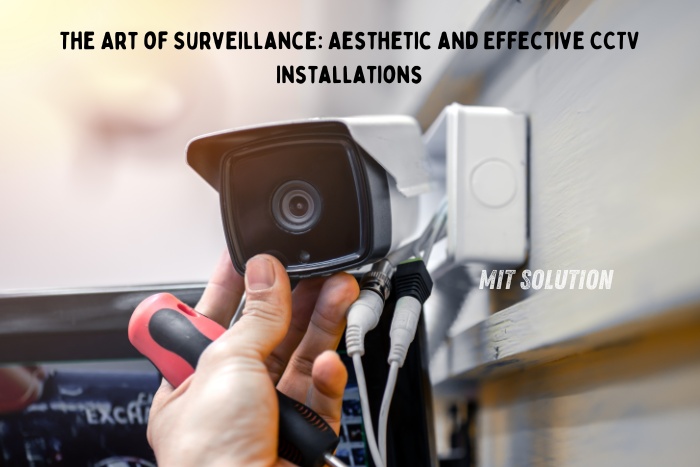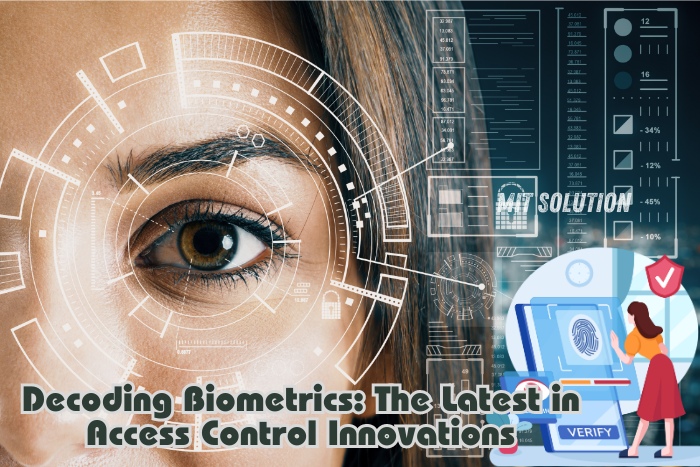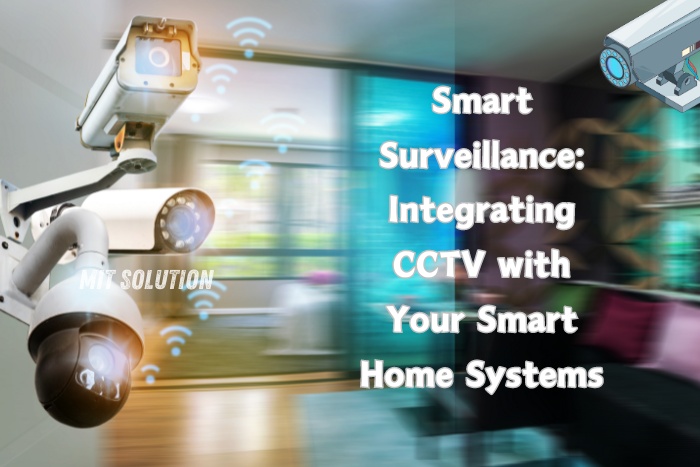Businesses under more pressure than ever to follow compliance rules and guard themselves against legal problems in the current regulatory scene. Meeting these needs is mostly dependent on CCTV systems, which protect businesses, help them stay compliant, and guarantee workplace safety, so preventing expensive litigation. Our specialty at MIT Solution in Dindigul, Tamil Nadu, is offering CCTV solutions that not only improve security but also help companies fulfill legal and compliance criteria.
We shall discuss in this blog the essential purposes of CCTV systems in controlling legal challenges and compliance. We will explore the reasons why companies need CCTV, how it might solve different legal issues, and the ways it facilitates compliance initiatives.
Understanding the Role of CCTV in Compliance
For companies in many different fields, one basic need is following legal guidelines. Following these guidelines reduces risk and helps to preserve a good name from rules on data protection to workplace safety standards. In many respects, CCTV systems are a useful tool for compliance:
1. Record Keeping and Documentation
Constant video footage from CCTV serves as a complete record of daily events inside a company. This material is crucial in case a company is obliged to show proof of adherence to operational guidelines or safety standards.
2. Tracking Compliance with Safety Policies
Strong safety procedures abound in many sectors, including manufacturing and healthcare. CCTV systems give recorded evidence in case of audits and enable companies to make sure staff members follow these procedures.
3. Sensitive Information Protection
Data protection laws like GDPR force companies to protect private and delicate data. CCTV guarantees data protection laws’ compliance by preventing illegal access to restricted areas.
4. Staff Responsibility and Openness
CCTV systems support open workplaces where staff members know they are watched over. This responsibility can help to lower incidents of harassment, discrimination, or other workplace problems as well as support adherence to rules on behavior.
At MIT Solution, we provide Dindigul companies with CCTV solutions meant to support their compliance objectives so they remain in line with legal requirements and safeguard their operations.
Legal Benefits of CCTV Systems
Apart from compliance, CCTV systems have major advantages in handling legal matters. Here’s how CCTV can help companies guard against legal risks:
1. Evidence Gathering in Conflict Management
Whether it’s a case of workplace harassment, theft, or customer incidents, CCTV footage is invaluable evidence in court cases. Excellent video can offer indisputable evidence, allowing companies to fairly and fast address problems.
2. Defense Against False Charges
CCTV can guard against false claims in sectors like retail and hospitality where customer interaction is rather high. For example, a client might assert to have been hurt on your property; CCTV footage helps to validate the claim.
3. Assisting in Workplace Inquiries
Should an internal investigation be called for perhaps in response to misbehavior or theft CCTV footage can help to identify accountable parties. When legal action or disciplinary procedures might be required, this data is especially helpful.
4. Liability and Insurance Claims
By streamlining the insurance claim filing process, CCTV footage gives insurers clear proof of events including property damage or break-ins. Many insurance companies even provide businesses with strong CCTV systems premium discounts.
5. Crime and Misconduct Deterrence
CCTV cameras discourage both internal and outside threats as well as misbehavior. Knowing they are under surveillance reduces employees’ likelihood of acting in ways that might cause legal problems.
Compliance Regulations Requiring CCTV
As part of their legal and regulatory compliance, many sectors call for CCTV monitoring. Some industries where compliance depends on CCTV are shown below:
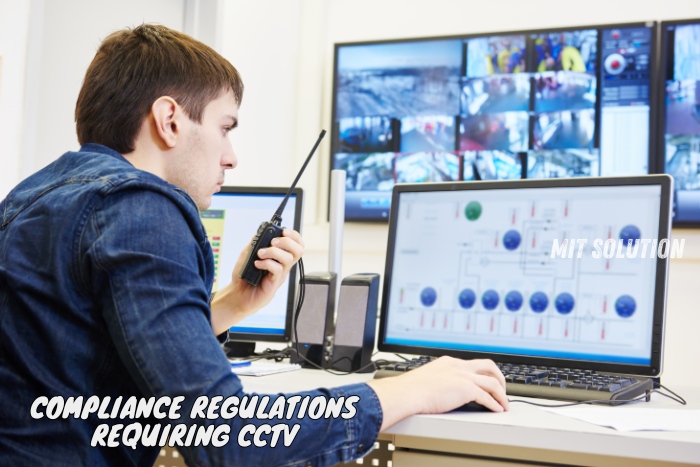
1. Banking Services
To stop theft, fraud, and other financial crimes, financial institutions have to put strict security policies into action including CCTV monitoring. To follow rules, banks and other financial services providers have to guarantee ongoing observation.
2. Healthcare
Hospitals and clinics have to follow patient privacy rules and guarantee a safe surroundings. CCTV systems let medical facilities keep an eye on sensitive areas without violating patient privacy.
3. Retail
Retailers depend on CCTV to guard employee and customer safety, monitor cash handling, and deter theft. Local rules mandate that many retail stores have CCTV in place to satisfy safety criteria.
4. Food and Drink
Food processing companies, restaurants, and food stores have to follow hygienic and safety guidelines. CCTV offers visual proof of correct sanitation methods and helps keep an eye on adherence to these criteria.
5. Logistically and transportationally
To follow operational guidelines and safety, warehouses and distribution hubs sometimes require CCTV to monitor the handling and movement of goods to stop loss and uphold responsibility.
Understanding the particular compliance needs of different sectors, MIT Solution provides CCTV systems that fit these particular needs, so helping companies in Dindigul to satisfy industry-specific requirements.
Features of CCTV Systems That Support Compliance and Legal Protection
One should search for specific characteristics while choosing a CCTV system to support legal criteria and compliance. MIT Solution advises companies in Dindigul to have these main qualities:
1. High-resolution cameras
Identification of people, objects, and actions depends on clear, high-quality video. High-resolution video guarantees that events recorded are sufficiently detailed to act as consistent evidence.
2. Remote Access and Instantaneous Watching
Remote access to CCTV footage lets companies track compliance from several sites. Real-time monitoring guarantees quick reaction to any violations of compliance or security.
3. Information Encryption and Safe Storage
Especially for companies managing confidential data, data security is absolutely vital. Our CCTV systems provide encrypted storage choices meant to stop illegal access and manipulation.
4. Easy Access Cloud Backup
By keeping CCTV footage off-site to guarantee it stays safe even in the event of on-site system damage, cloud storage offers still another layer of security.
5. Reporting Advanced Analytics
Analytics tools including motion detection and behavioral analysis found in advanced CCTV systems can draw attention to possible security flaws or compliance breaches.
6. Event Recording and Time Stamping
Time-stamped video and thorough event logs make tracking and proof simple. In audits or court cases, when exact documentation is needed, this function is especially helpful.
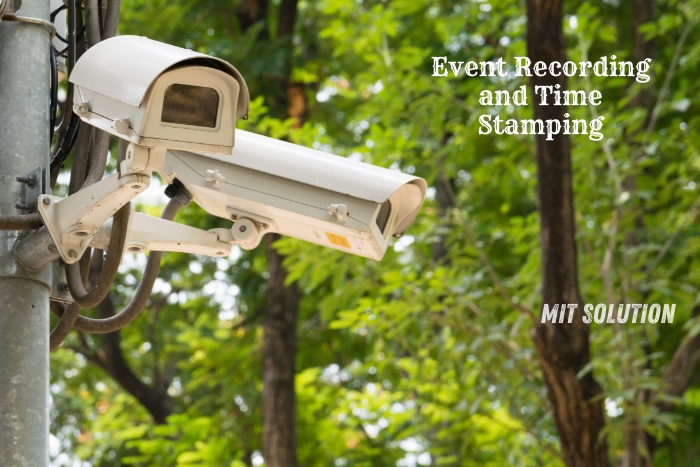
How MIT Solution’s CCTV Systems Support Compliance in Dindigul
Using our premium CCTV systems, we at MIT Solution have a great deal of experience guiding companies in Dindigul toward compliance and avoidance of legal problems. We can assist your compliance requirements as follows:
1. Specifically Designed Solutions for Your Sector
Every sector has particular compliance needs, as we are aware. Our staff will work closely with you to create a CCTV solution compliant with your particular legal requirements.
2. Safe Data Storage
Our first concern is data security; thus, we make sure your CCTV footage is kept safely by means of encrypted cloud-based storage solutions compliant with data security laws.
3. Professional Opinion on Compliance Guidelines
Our staff keeps current with industry standards so that our solutions satisfy the compliance requirements of many different sectors. We offer professional advice on best methods for compliantly using CCTV.
4. All- Around Support and Maintenance
To guarantee they run as they should, CCTV systems need constant maintenance. Continuous support and maintenance provided by MIT Solution guarantees that your system is always ready to satisfy legal and compliance criteria.
Best Practices for Using CCTV in Compliance and Legal Situations
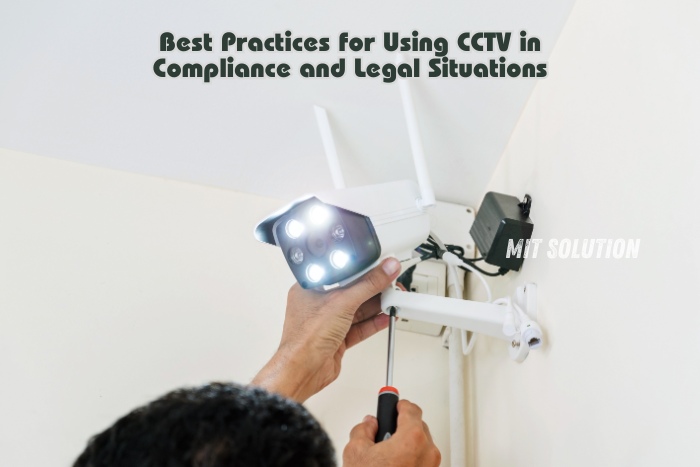
1. Notify Staff Members and Guests
Compliance with privacy regulations depends on clearly telling staff members and guests they are being watched over. Show obvious signs pointing to CCTV to guarantee openness.
2. Create explicit CCTV usage rules
Create a clear policy with reference to the goals of CCTV monitoring, storage of footage, and access rights. Employees should be informed of this policy to help to create an open culture.
3. Limit Monitoring to Essential Domains
Focus CCTV coverage on areas where security is required such as doors, exits, storage rooms, and offices that comply with privacy rules.
4. Review Systems and Footage Regularly
Review CCTV footage on occasion to confirm compliance criteria are being followed and spot any possible problems. Routine inspections also guarantee that cameras are producing high-quality video and operating as they should.
5. Apply limited storage and deletion policies
Establish a data retention policy detailing the length of time footage will be kept and when it will be deleted. This approach lowers storage costs and conforms with data protection regulations.
6. Staff Training on CCTV Use and Compliance
Make sure your employees see how CCTV supports legal requirements and compliance. Teaching staff members system compliance rules and functionality helps to create a safe and compliant workplace.
Challenges and Considerations for CCTV in Legal and Compliance Matters
Although CCTV offers major advantages, companies should also be aware of possible difficulties, especially with relation to ethical issues and data privacy.
1. Issues regarding data privacy
Data privacy laws apply to CCTV footage, thus companies have to make sure they are just used for security needs. Frequent reviews of CCTV use can help to guarantee privacy law compliance.
2.Moral Consequences of Monitoring
Although CCTV improves security, too much monitoring can lower employee morale and generate ethical questions. Limit monitoring to high-risk areas to balance security with regard for employee privacy.
3. Access Control and Storage Management
Essential first steps in data protection are securely storing CCTV footage and restricting access to authorised staff. The encrypted and cloud-based storage options of MIT Solution enable Dindigul’s companies to stay data security compliant.
Final Thoughts: The Essential Role of CCTV in Compliance and Legal Issues
Excellent tools for enabling companies to satisfy compliance criteria and stay out of legal hotbeds are CCTV systems. CCTV supports a safe and open workplace by means of consistent evidence, compliance monitoring, and sensitive area protection.
